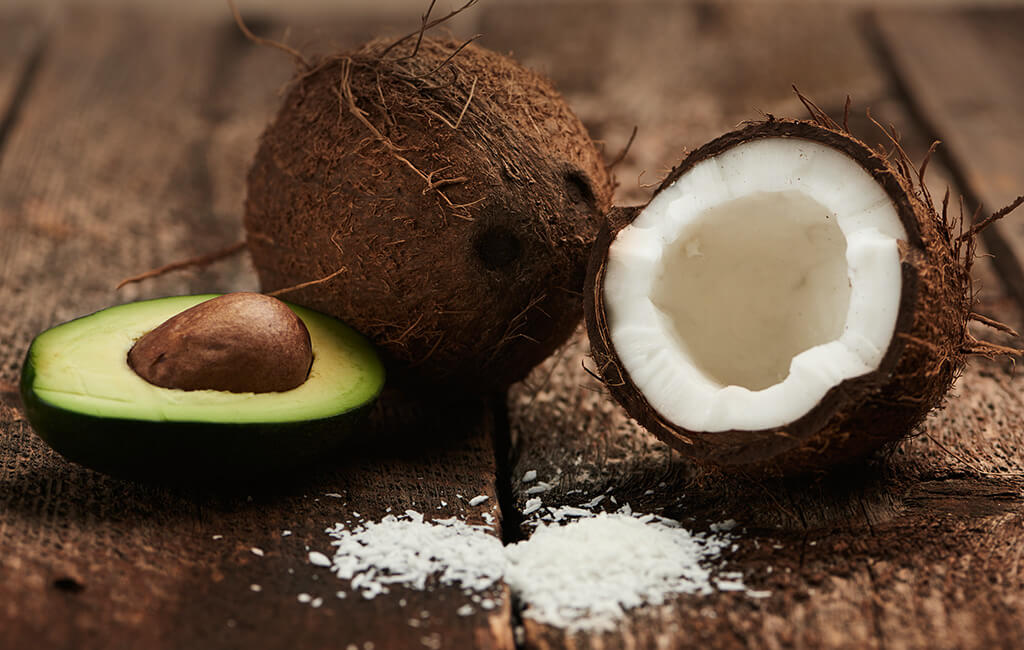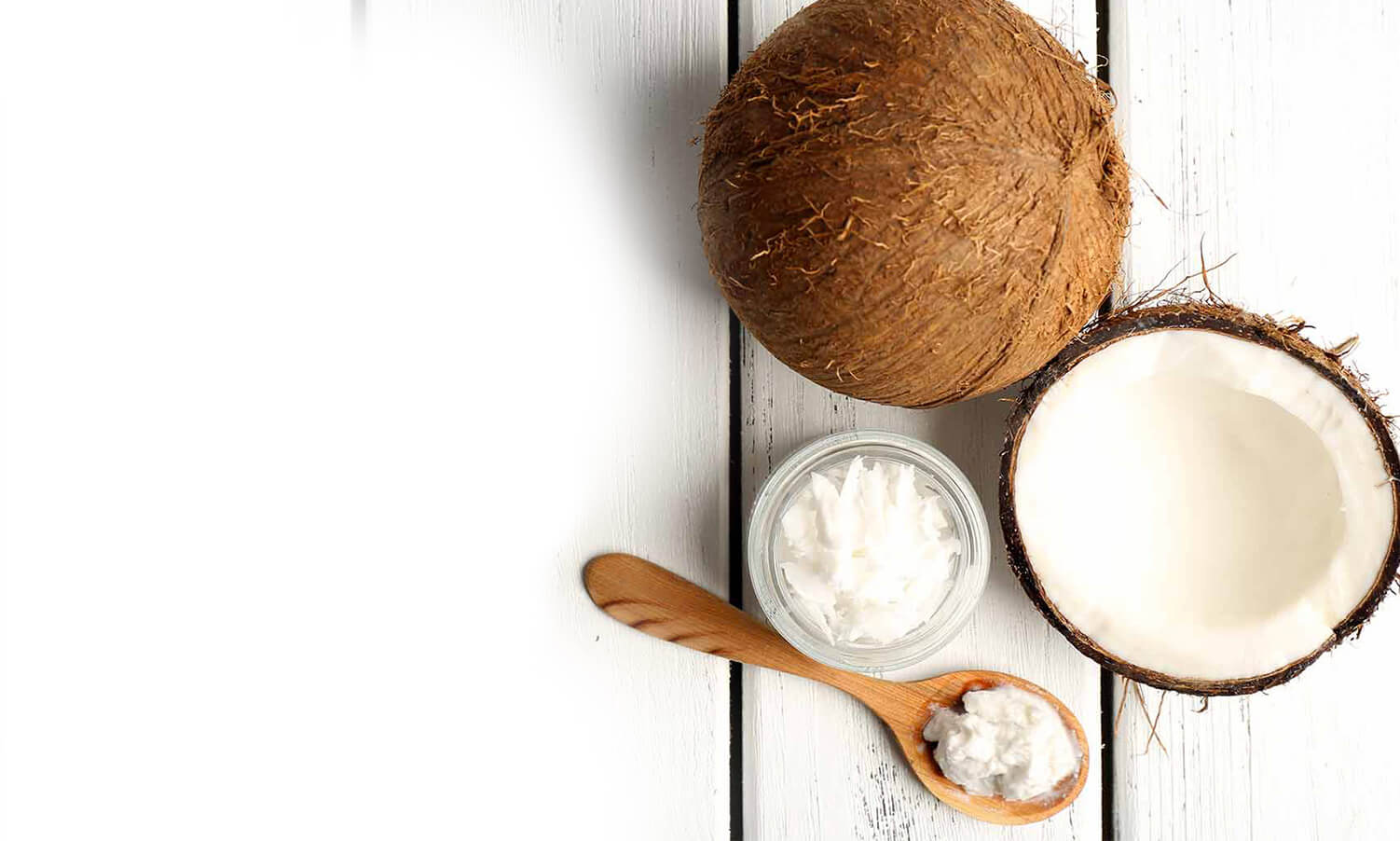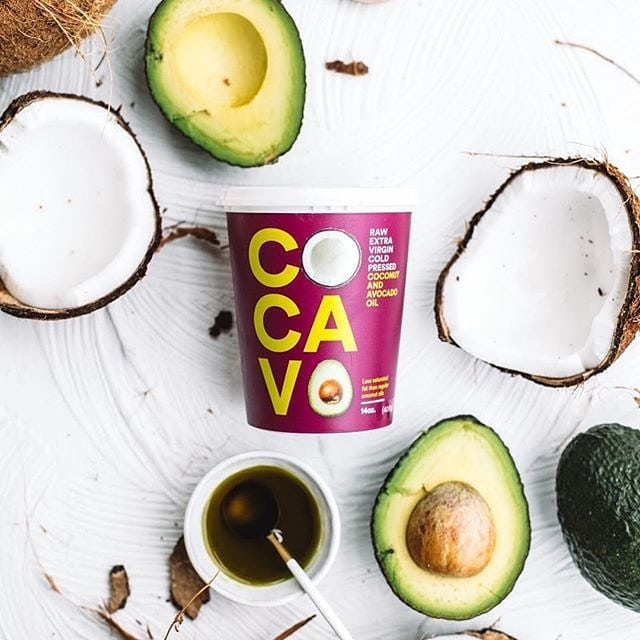Lets take a look at what’s really going on inside Cocavo.
It can be daunting looking at the vast amounts of information and claims made about how beneficial extra virgin coconut and avocado oils are for us.
Especially when the information may be coming from unreliable sources, making it difficult to discern fact from fiction.
We want to do the work for you, and provide you with evidence-based information on what these oils can really do for you.

Because Cocavo is a blend of two very beneficial oils; coconut and avocado, we think it best to separate the two for your readability ease, as they each have their own individual beneficial properties.

Extra Virgin Coconut Oil
Background
Extra virgin coconut oil is created from the wet meat of the fruit, from the coconut (Cocos nucifera) palm, which is grown and cultivated to provide a wide range of products, due to its nutritional and medicinal values. In the Tropics and Pacific Islands, the healthful properties of coconut oil have been used traditionally for thousands of years for a wide variety of purposes. Coconuts are classified as highly nutritious functional food. They are rich in dietary fibre, vitamins and minerals and may be beneficial in the treatment of obesity, elevated LDL (bad cholesterol), insulin resistance and hypertension. These are the risk factors for cardiovascular diseases (CVD), type 2 diabetes, and Alzheimer’s disease (the phenolic compounds and hormones (cytokinins) found in coconuts may inhibit a key step in the pathogenesis of Alzheimer’s disease).
Many of the properties of coconut oil can be traced to medium-chain fatty acids (such as lauric acid), which are metabolized differently from long-chain fatty acids (which most other dietary fats are). Coconut oil is comprised of MCFA’s which are unique, as they are easily absorbed and metabolised by the liver and can be converted to ketones. Ketone bodies are an important alternative energy source in the brain and may be beneficial to people developing or already with memory impairment (i.e. Alzheimer’s disease). The unique metabolism of MCFA’s may help explain some of the coconut oil’s physiological effects. Historically, fats have been viewed as ‘unhealthy’ as ‘politically correct nutrition’ has been based on the assumption that fat intake should be minimal, especially saturated fats. Recent studies are challenging this viewpoint due to the many beneficial components being discovered in dietary fats.
Fats as part of a meal (dietary fats) slow down absorption so that we feel fuller for longer, and additionally acting as carriers for important fat-soluble vitamins (i.e. A, D, E, and K) too. Dietary fats are needed for providing the building blocks for cell membranes, a variety of hormones, mineral absorption, and for many other critical processes in the body, in order for it to function properly. Because MCFA’s are rapidly metabolised in the liver, they do not contribute to fat accumulation or obesity nearly as much as other dietary fatty acids. A modest, yet statistically significant response in reduced waist circumference was shown in two trial studies from a relatively minor dietary modification (consuming coconut oil). Coconut oil may stimulate fat loss by increasing thermogenesis (a process that generates body heat directly from fat instead of producing ATP) which has been linked to weight loss.
Coconut oils predominant fatty acid is lauric acid, which has antimicrobial properties. Lauric acid and its derivative monolaurin have antimicrobial activity against gram-positive bacteria and some fungi and viruses (Dayrit, 2015). The antimicrobial properties of lauric acid can be traced to three main mechanisms:
- Destruction of the cell membrane of gram-positive bacteria and lipid-coated viruses,
- Interference with microbial processes such as transcription and signal transduction,
- And stabilization of human cell membranes.
Regarding cosmetics, coconut oil can be very useful and beneficial due to the unique properties it contains.
Dental hygiene: Although evidence of its efficacy is mostly anecdotal at this point, coconut oil pulling has been reported to reduce or prevent bad breath, gingivitis, and tooth decay.
Skin: Rubbing extra virgin coconut oil directly onto skin can boost moisture and lipid content (Agero, 2004), and due to its antiseptic properties, it could benefit certain people with skin conditions.
Hair: Coconut oil has a high affinity for hair proteins because of lauric acid’s low molecular weight and straight linear chain, is able to penetrate inside the hair shaft. Coconut oil reduces protein loss for both undamaged and damaged hair when used as a pre-wash and post-wash grooming product.
Benefits: Culinary
Many of the properties of coconut oil can be traced to medium-chain fatty acids (such as lauric acid), which are metabolized differently from long-chain fatty acids (which most other dietary fats are). Coconut oil is comprised of MCFA’s which are unique, as they are easily absorbed and metabolised by the liver and can be converted to ketones. Ketone bodies are an important alternative energy source in the brain and may be beneficial to people developing or already with memory impairment (i.e. Alzheimer’s disease). The unique metabolism of MCFA’s may help explain some of the coconut oil’s physiological effects. Historically, fats have been viewed as ‘unhealthy’ as ‘politically correct nutrition’ has been based on the assumption that fat intake should be minimal, especially saturated fats. Recent studies are challenging this viewpoint due to the many beneficial components being discovered in dietary fats.
Fats as part of a meal (dietary fats) slow down absorption so that we feel fuller for longer, and additionally acting as carriers for important fat-soluble vitamins (i.e. A, D, E, and K) too. Dietary fats are needed for providing the building blocks for cell membranes, a variety of hormones, mineral absorption, and for many other critical processes in the body, in order for it to function properly. Because MCFA’s are rapidly metabolised in the liver, they do not contribute to fat accumulation or obesity nearly as much as other dietary fatty acids. A modest, yet statistically significant response in reduced waist circumference was shown in two trial studies from a relatively minor dietary modification (consuming coconut oil). Coconut oil may stimulate fat loss by increasing thermogenesis (a process that generates body heat directly from fat instead of producing ATP) which has been linked to weight loss.
Benefits: Cosmetically
Coconut oils predominant fatty acid is lauric acid, which has antimicrobial properties. Lauric acid and its derivative monolaurin have antimicrobial activity against gram-positive bacteria and some fungi and viruses. The antimicrobial properties of lauric acid can be traced to three main mechanisms:
- Destruction of the cell membrane of gram-positive bacteria and lipid-coated viruses,
- Interference with microbial processes such as transcription and signal transduction,
- And stabilization of human cell membranes.
Regarding cosmetics, coconut oil can be very useful and beneficial due to the unique properties it contains.
Dental hygiene: Although evidence of its efficacy is mostly anecdotal at this point, coconut oil pulling has been reported to reduce or prevent bad breath, gingivitis, and tooth decay.
Skin: Rubbing extra virgin coconut oil directly onto skin can boost moisture and lipid content, and due to its antiseptic properties, it could benefit certain people with skin conditions.
Hair: Coconut oil has a high affinity for hair proteins because of lauric acid’s low molecular weight and straight linear chain, is able to penetrate inside the hair shaft. Coconut oil reduces protein loss for both undamaged and damaged hair when used as a pre-wash and post-wash grooming product.

Extra Virgin Avocado Oil
Background
Avocado oil, obtained from the flesh of the fruit, is a relatively new arrival in culinary circles. The predominant uses of avocado oil have been in the cosmetic industry due to its stability and high concentration of vitamin E (α-tocopherol). In skincare, the two major advantages of avocado oil are it’s marked softening and soothing nature and its notable absorption. For example, compared with almond, corn, olive, and soybean oils, avocado oil had the highest skin-penetration rate. Avocado oil has been renowned for its healing and regenerating properties throughout history, with writings from the sixteenth century reporting the use of oil obtained from its seed being used to treat rashes and scars.
Historically, avocado oil has been extracted by relatively harsh methods (high temperature and solvent extraction), typically followed by standard refining steps (refining, bleaching, and deodorizing). The development in the twenty-first century saw the success of cold-pressing avocado fruit using technologies similar to those used to produce extra-virgin olive oil. This successful development was led by New Zealand, and its commercialization started in 2000.
Overall, limited published information exists on avocado oil, and even less on cold-pressed avocado oil. Cold-pressed avocado oil is a relatively recent product with significant production beginning in the twenty-first century. The avocado oil industry has grown relatively slowly. One main reason for this being, the avocado oil industry is a side-industry of the fresh-fruit industry, and the volume of fruit available for processing can suffer significant annual fluctuations.
Benefits: Culinary
Because of the nature of cold-pressed avocado oil extraction (i.e. the lack of post-extraction refinement), it contains significantly high levels of pigments such as carotenes, xanthophylls, and chlorophyll, which are reflected by its rich green colour. Since these pigments act as antioxidants, they are believed to provide protection from diseases.
Of the pigments in avocado oil, the carotenoid lutein is probably the most important, due to its strong antioxidant activity which helps in reducing the incidence of various diseases including AMD (age-related macular degeneration), the leading cause of loss of vision in the elderly. These carotenoid pigments are believed to protect the cells of the macula from light-induced damage. Avocado oil contains approximately twice as much lutein as olive oil.
Oils extracted from plant sources also contain a number of phytochemicals, which may have important health benefits in terms of disease prevention. The phytochemicals present, such as α-tocopherol (vitamin E), and the high levels of sterols (principally sitosterol), are believed to contribute to health.
Vitamin E is an essential vitamin that has good antioxidant properties. The concentration in avocado oil is around 0.1–0.14 mg g-1. Retaining vitamin E assists in extending the shelf life of avocado oil, since α-tocopherol scavenges free radicals produced during oxidation reactions and also terminates the reaction chain. Vitamin E is an essential vitamin and is widely recognized as a powerful antioxidant. These antioxidants prevent the formation of damaging free radicals from the body’s normal oxidation processes and are associated with the reduction in the incidence of cardiovascular diseases. Based on the Australia and New Zealand guidelines for nutrient intakes, one teaspoon of avocado oil would provide approximately one-ninth of the recommended dietary target of vitamin E for men.
Avocado fruit contains the highest levels of plant sterols of any fruit. Since plant sterols are soluble in fat, they are extracted with the oil from the avocado. Plant sterols have a beneficial effect on lowering blood cholesterol levels in humans. The consumption of adequate amounts of plant sterols can reduce the risk of heart disease. The lipid content of avocados is made up of 15–20% of saturated fats, 60–70% of monounsaturates and around 10% of polyunsaturates. A diet high in monounsaturated fatty acids (MUFAs) is recommended for favorable effects on lipoprotein levels, endothelium vasodilation, insulin resistance, metabolic syndrome, antioxidant capacity, and myocardial and cardiovascular mortality. Avocado oil also has a very high smoke point (over 250°C) which makes it suitable for shallow pan frying and heating for food preparation.
Benefits: Cosmetically
Due to its soothing and moisturizing effects, avocado oil was added to pharmaceutical creams for the treatment of common skin conditions such as psoriasis and dandruff with results superior to the traditional medicated therapy. Avocado oil has been used in skincare products since it is rapidly absorbed by the skin and has sunscreen properties.
Avocado oil is claimed to be good for tissue and massage creams, muscle oils, and other products where lubrication and penetration are essential, as it is one of the most penetrating oils available for cosmetics and soaps, and it forms smoother creams than other oils. It also forms finer emulsions because it reduces surface tension and has been used in soaps to provide improved lathering.

We hope that the peer-reviewed information we supplied here can help bring clarity and inspiration to incorporate Cocavo, a blend of these two incredibly health-promoting oils, into your diet and beauty routines daily.
Cassidy, L. (2016). Coconut Oil Bloom. Retrieved from: https://www.aocs.org/stay-informed/inform-magazine/featured-articles/coconut-oil-boom-may-2016.
Woolf, A., Wong, M., Eyres, L., McGhie, T., Lund, C., Olsson, S., & Requejo-Jackman, C. (2009). Avocado oil. In Gourmet and health-promoting specialty oils (pp. 73-125). AOCS Press.

Cocavo Original
Cocavo is made from premium all natural ingredients, providing a sweet and delicious, yet delicate flavor.
It is the perfect cooking oil to enhance a wide variety of dishes from curries to stir-fries. Cocavo is dairy free, gluten free and suitable for vegans and vegetarians.

Cocavo Light
Cocavo Light is made from pure coconut oil and extra virgin avocado oil. The delicious, buttery yet mild flavor does not have the aroma or taste of coconut making it the perfect cooking oil for everyday use.
Cocavo Light is dairy free, gluten free and suitable for vegans.

Chili and Lime
Cocavo is carefully infused with selected chili and lime oils giving you the perfect blend. Cocavo enhances and brings out the flavors in dishes from seafood to stir-fry. The subtle hint of chili is perfect.
Cocavo Chili and Lime is dairy free, gluten free and suitable for vegans.
